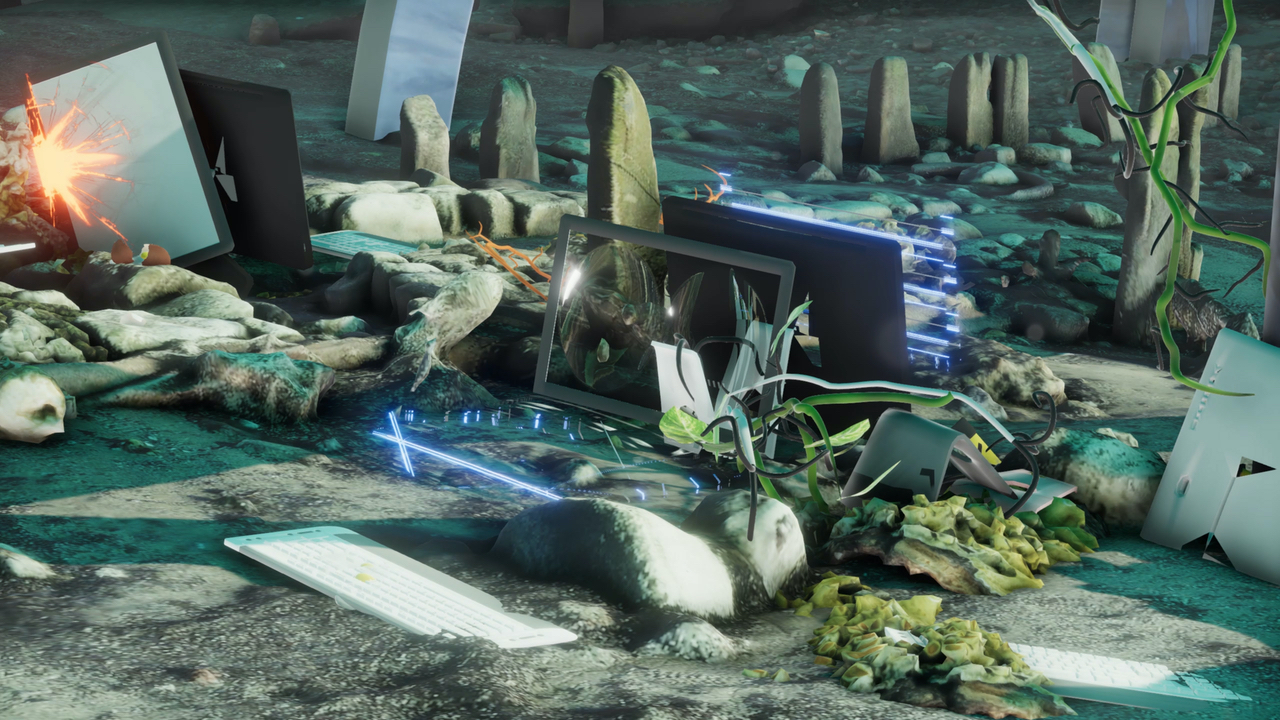Two disembodied avatars attempt to navigate the ruins of interconnected sites of memory and loss.
“Maybe your memories need an architectural container – to keep them at one place,” posits one of the disembodied avatars we are introduced to in Mario Mu’s virtual exploration of mnemonic architecture, Sites Of Encounter. Using the video game engine Unity, the Croatian artist has created a digital ecosystem that serves as a site of both memory and loss for two characters to unpack the emotional spaces they find themselves in.
Taking the form of an existential dialogue, Sites Of Encounter takes the gamification of the conditions of labour to its natural extension, following the two avatars as they navigate literal sites of labour as though exploring the open world of a video game. This hybrid virtual world built by Mario Mu takes the sterile interior of an office space and corrupts it with the continually crackling fire and billowing smoke of an industrial wasteland, an impossible amalgamation of old and new forms of labour.


“The digital ecosystem can be viewed as a spatial and cultural product of human labour,” explains collaborator Tamara Hart. “Within this highly competitive environment, interactions are dictated by a battle royale for survival. As the players roam through a glowing office, ripe with vegetal ruins and draped in a tapestry of flames, they activate memories associated with their surroundings.”
It’s throughout this roaming that Sites Of Encounter’s avatars slowly reveal their inner most concerns, as one voice becomes consumed with the anxiety of trying to remember, while the other relaxes into the entropy of forgetting. “Hey, I am here,” affirms one voice, situating themselves into a space in which they lack a body. “You are still afraid of loosing a job,” says the other later on, tethering their existence to their function as workers while proving that their existence within the space of labour transcends the need for actual presence, as well as the need for memory. “Are you confused or afraid?”


Within the back-and-forth of their dialogue the fruitless search for sparrows, which we can hear but not see, is shown to be analogous with the avatars’ own search for themselves within their ecosystem. “There has to be something with this building,” asserts one voice, “That’s ghosthunting,” the other replies, their voice reverberating around a pile of broken computers and coral. “Buildings become checkpoints, housing imprints of thoughts and memories,” explains Tamara Hart.
“The sites they encounter are catalysts, prompting them to uncover contradictory narratives of exploitation, grief and love.” Through what Mario Mu terms “a perpetual process of trial and error”, the avatars of Sites Of Encounter learn what it means to inhabit the space which defines them, progressing from player character to NPC as they give in to the space around them, their words regressing into the nonsensical chirrups of the missing flutter of sparrows they seek.


“We realise the protagonists may not be human after all, but rather spatial avatars, containers of memory in which reality systems collide”, concludes Hart. “Sites of Encounter questions how we might reflect on this morphology of objects and learn to remap our perception of space, memory and labour in alternative ways.”
Sites Of Encounter is a continuation of Architecture With Games In The Title, and ongoing collaborative research project started by Mu in 2019.
For more information about Mario Mu and his work, you can visit his website and follow him on Instagram.
Watch next: Zo create a virtual universe from sound and light in Ka’et




